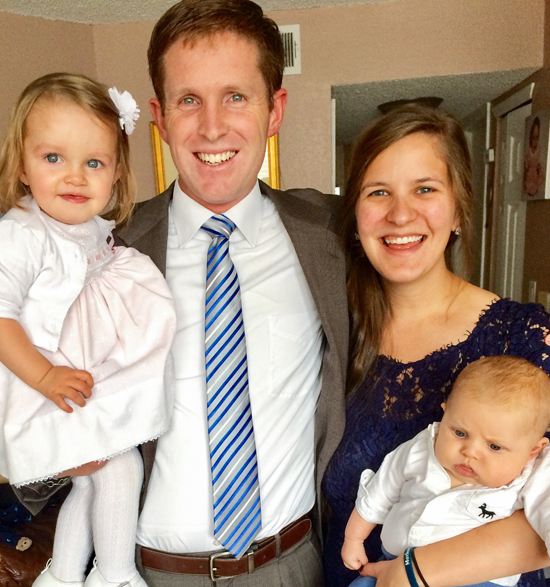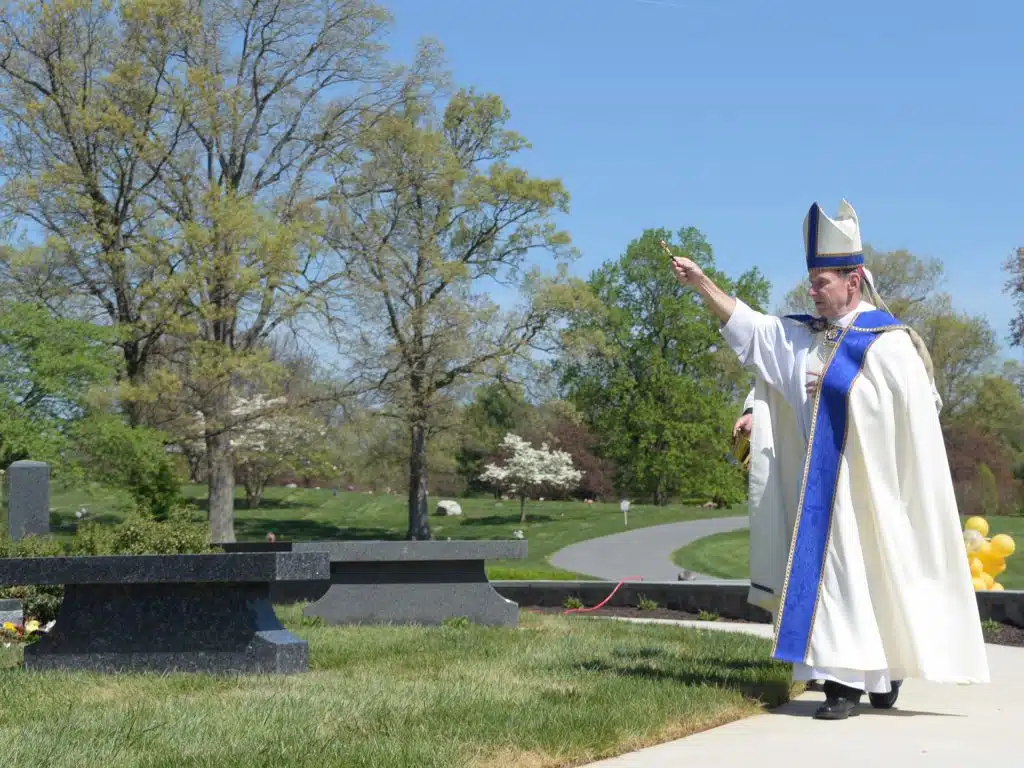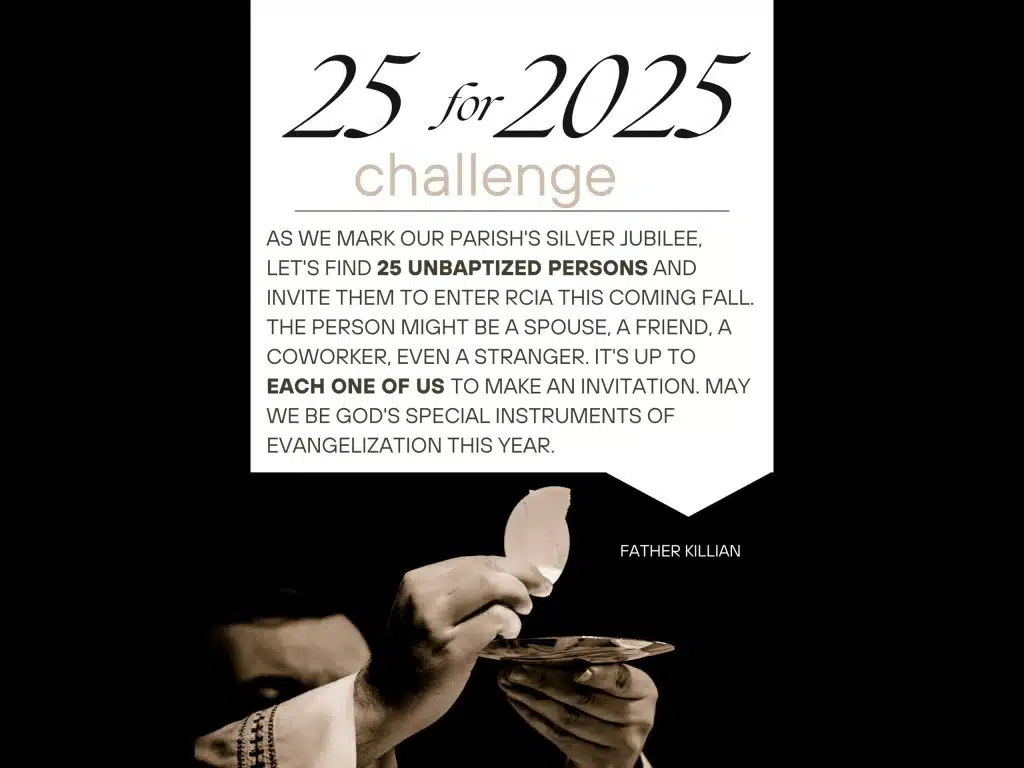They call it “bare-handing” and it’s the technique that David Hickson and other Fellowship of Catholic University Students volunteers, or FOCUS “missionaries,” as they call themselves, employ when they approach prospects on campus.
The missionaries, often college- or graduate school-age themselves, carry nothing in their hands. There are no brochures, flyers, religious pamphlets or Bibles, which might scare students off or at the least distract from the direct and heartfelt contact the missionaries wish to make.
David Hickson and his wife, Linda, pose for a photo with their children Therese and John Paul. COURTESY
“We’ll ask them things like ‘Is there such a thing as objective truth?’ or ‘Where do you think we go when we die?’, some questions people don’t usually ask,” said David, a Diocese of Arlington native who is now FOCUS’ Mission Trip Expansion Specialist, based in Lakewood, Colo. “Sometimes it piques their interest, sometimes they say, ‘No, I’m not ready for that.’ ”
For the curious, David said there may be an invitation to dinner, or Bible study, or just to talk. If the student is Catholic but isn’t strong in the practice of the faith, FOCUS missionaries will nudge him or her back to the sacraments. Then there are others who, like a recent student approached at Baylor University in Waco, Texas, realized that although they were raised in the faith they “never had a relationship with Christ.”
In that case, David said the job is to help them become Christ-dependent in a world that can seem deaf to his message.
The 33-year-old father of two realizes that he has much in common with students whose faith was once taken for granted. David was never “bare-handed,” but his personal journey of faith has included stops and starts.
He was raised the third of eight children on a farm near Marshall, about 12 miles north of Warrenton. His mother, Sharon, a “beautiful woman,” essentially raised the family herself. She stressed the importance of praying the rosary, attending Mass without fail on Sundays and on weekdays when possible, David said. At St. John the Evangelist Church in Warrenton, the family’s parish, the anxious-to-please David went to confession often, focusing on a basket of minor sins so that the priest would be impressed by his contrition but not scandalized.
He thought himself a good Catholic, but knows now that “there was no heart in it.”
“We had the faith, but we really didn’t do anything with it,” David said. “We did what was expected of us.”
A parish trip to World Youth Day in Toronto in July 2002 caused the then 18-year-old to realize just what he had been missing.
A huge crowd of 800,000 or so young Catholics of every language and color and from every corner of the globe, gathered for an outdoor Mass celebrated by Pope John Paul II. The 82-year-old pontiff, wracked by Parkinson’s disease and bearing bullet scars from a 1981 attack, hobbled forward on the arm of an aide, his head bent awkwardly to one side. The assembled youths sent up a mighty roar.
Something the pope said during the festival seemed aimed directly at David:
“The question will not go away. On what foundations, on what certainties should we build our lives and the life of the community to which we belong? Dear friends, spontaneously in your hearts, in the enthusiasm of your young years, you know the answer… It is Christ.”
“It clicked that … this is the church from Peter,” David recalled. “All these colors of people who live the faith, all speaking different languages, and the pope, he’s the father who speaks the language of all people … . It was life-changing.”
The image of John Paul II stayed with him. “He was probably a father figure for me, but there was more,” said David. “There he was, all bent over, never crying, (instead) saying ‘John Paul II, he loves you, too.’ ” I thought, of course he’s here with us. Did Christ ever leave His cross?”
Fired up, David set out on a four-month mission trip to Monterrey, Mexico, and promptly hit a wall. His job was to teach English to underprivileged children. But he spoke no Spanish, and spent the first month oppressed by loneliness and miserable in very humble living conditions. David thought of giving up, prayed for a conversion of heart, then noted with satisfaction how things improved — gradually. He finished the mission with a sense of fulfillment but also a persistent, gnawing thought that he was being called to do more. It was a faint call, David said, and a feeling that remained just out of sight, in the background of his life.
Then came four years at Franciscan University of Steubenville, Ohio, where David switched majors from computer science to Spanish and French after deciding that he wanted to work with people. Just what form that work would take hadn’t become clear. At Franciscan, David made the acquaintance of Gabe Hahn, a FOCUS volunteer who introduced him to the program and took him to Bible study. David began to make financial contributions to support individual FOCUS missionaries, and traveled on their short-term summer mission trips. He was struck by the ability of Hahn — a “married older guy with three kids” — to preach by action.
Then came a couple of stutter-steps, including considering joining the Marine Corps and, briefly, the priesthood. David said he knew he wanted to work with people, but wasn’t sure how.
After graduation, he taught Spanish at St. Louis Catholic School in Alexandria for four years, then moved to The Heights, a private, Opus Dei boys school in Potomac. David loved it there, and was considering a graduate degree and pursuing a teaching career but was uncertain if that would answer his lingering sense of being called. David would meditate on a Latin inscription that the school had posted — “Ego vocavi te,” or “I have called you” — and asked himself what it meant in his life.
“I knew He was calling me, but what was He calling me to?” David said. “I prayed.”
The answer came gradually after two years at The Heights — become a FOCUS campus missionary. In 2012, David shared his faith decision somewhat reluctantly with school leaders, knowing that they had hoped he would pursue graduate work and return to teaching. He credits school Headmaster Alvaro de Vicente with giving him the final nudge.
“He said, ‘This is not what I want, but if it is what God desires, get the hell out of here,’ ” David recalled.
Things happened fast. On a mission trip to the Our Lady of Guadalupe Shrine in Mexico City, he met his future wife and fellow FOCUS missionary, Linda Moorhead, who also had just left a teaching job to join FOCUS. They dated during their third year as FOCUS missionaries and married in their fourth year, on the Feast of the Assumption, Aug. 15, 2015.
Daughter Therese, as in Lisieux, was born in May 2016, followed by brother, John Paul this past August. After serving in campus missions at Auburn University, the U.S. Naval Academy, the U.S. Coast Guard Academy and the University of Virginia, the family relocated to the Denver area as David begins his second year as FOCUS’ Mission Trip Expansion Specialist. The job involves developing and maintaining relationships with faith groups in the U.S. and 42 other countries where FOCUS sponsors weeklong “mission trips,” usually scheduled around college vacations. On these trips, FOCUS missionaries undertake work projects, such as painting a local school, and lead lowkey, FOCUS style faith discussions with local teens and adults. Daily Mass and holy hours are part of the regime, as is what David calls a “social media and dating fast,” the better to focus on FOCUS.
But David’s heart is never far from campus ministry. The college scene is “probably the biggest battlefield anyone can be on these days, what with peer pressure and such,” not to mention a lack of spiritual support. “Students often come to us because we are a safe, quiet place,” he said.
David and his fellow FOCUS missionaries often hear from parents, exasperated and frightened that their college students have discarded their faith. What, they ask, can David do?
“’You can’t get them to do anything, and neither can I,’” he answers. “But Christ can.
“It’s not easy, but pray for them. There are (FOCUS) people out on campus who are challenging students. There’s hope.”
Willing is a freelance writer from McLean.



